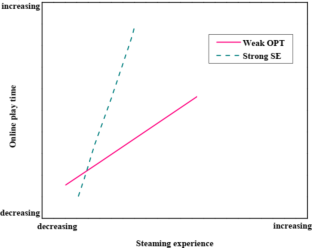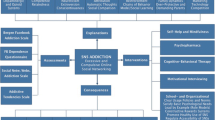Abstract
The purpose of online games is to enjoy, and several teenagers find this type of online activity to be very enjoyable. Studies show that those with online gaming issues are more likely to display violent, depressed, and anxious behaviors. The primary cause of those disorders is their inability to control and control their own emotions, including their aggression, depression, stress, and other emotional states. This study quantitatively examines the effect of online game exercise interaction sustainability on flow experience, enhancing players’ flow experience by using online game exercise interaction as an explanatory variable. Even detrimental outcomes like bond slave, isolation, and indifference may result from the flow experience. For analysis, this study uses both quantitative research and a questionnaire. However, the length of online games had an inverted U-shaped modulator effect on how much flow experience was influenced by game interaction. Playing video games for an excessive amount of time can diminish the efficiency of game interaction and possibly have psychological effects including Internet bond slave, loneliness, and carelessness. The research summarizes the psychological factors influenced due to online games. The policy implications of this finding are that while acknowledging the positive impact of online game exercise interaction on traffic experience. The research focuses on the moderating effect of game duration and controlling gaming time to avoid the negative impact of online games on adolescents’ psychology.

Similar content being viewed by others
Data Availability
The data used to support the findings of this study are available from the corresponding author upon request.
References
Catalán, S., Martínez, E., & Wallace, E. (2019). The role of flow for mobile advergaming effectiveness. Online Information Review, 43(7), 1228–1244. https://doi.org/10.1108/OIR-06-2018-0198.
Chauhan, S., Mittal, M., Woźniak, M., Gupta, S., & de Pérez, R. (2021). A technology acceptance model-based analytics for online mobile games using machine learning techniques. Symmetry, 13(8), 1545. https://doi.org/10.3390/sym13081545.
Chen, Y., Wang, T., Tian, H., Su, D., Zhang, Q., & Wang, G. (2021). Advances in lithium–sulfur batteries: From academic research to commercial viability. Advanced Materials, 33(29), 2003666. https://doi.org/10.1002/adma.202003666.
Chou, T. J., & Ting, C. C. (2003). The role of flow experience in cyber-game addiction. CyberPsychology & Behavior, 6(6), 663–675. https://doi.org/10.1089/109493103322725469.
Danhong, Z., Ziqiang, W., & Lingfei, H. (2013). Social Interaction and Identity in Online Games. Journal of Lanzhou University, pp. 5.
Diane, C. (2015). Games and Pleasure, published on Computer Games: Text, Narrative and Play. Peking University Press, pp. 61.
Geniş, Ç., & Ayaz-Alkaya, S. (2023). Digital game addiction, social anxiety, and parental attitudes in adolescents: A cross-sectional study. Children and Youth Services Review, 149, 106931. https://doi.org/10.1016/j.childyouth.2023.106931.
Gong, A. D., & Huang, Y. T. (2023). Finding love in online games: Social interaction, parasocial phenomenon, and in-game purchase intention of female game players. Computers in Human Behavior, 143, 107681. https://doi.org/10.1016/j.chb.2023.107681.
Griffiths, M. D., Davies, M. N. O., & Chappell, D. (2004). Online Computer Gaming: A comparison of adolescent and adult gamers. Journal of Adolescence, 27, https://doi.org/10.1016/j.adolescence.2003.10.007.
Hausman, A. V., & Siekpe, J. S. (2009). The Effect of web interface features on Consumer Online Purchase Intentions. Journal of Business Research, 62. https://doi.org/10.1016/j.jbusres.2008.01.018.
Hsu, C. L., & Lu, H. P. (2004). Why do people play online games? Information & Management, Volume 41.
Isbister, K. (2018). Emotional design of Games: How to touch the hearts of players. Electronics Industry, 73, 48.
Jiajia, L. (2002). A Discussion on The Factors Influencing the Interactive Behaviour of Online game exercise Participants. Taiwan Dissertation of Chung Cheng University.
Karaca, S., Karakoc, A., Can Gurkan, O., Onan, N., & Unsal Barlas, G. (2020). Investigation of the online game addiction level, sociodemographic characteristics and social anxiety as risk factors for online game addiction in middle school students. Community Mental Health Journal, 56, 830–838. https://doi.org/10.1007/s10597-019-00544-z.
Khoshnoud, S., Igarzábal, F. A., & Wittmann, M. (2020). Peripheral-physiological and neural correlates of the flow experience while playing video games: A comprehensive review. PeerJ, 8, e10520. https://doi.org/10.7717/peerj.10520.
Koufaris, M. (2002). Applying the technology acceptance model and flow theory to online consumer behavior. Information Systems Research, 13(2), 205–223. https://doi.org/10.1287/isre.13.2.205.83.
Lei, L., Guohua, Z., & Hua, W. (2018). Adolescent and online game: A perspective of internet psychology (p. 96). Beijing Normal University Pub-lishing House.
Liao, G. Y., Cheng, T. C. E., & Teng, C. I. (2019). How do avatar attractiveness and customization impact online gamers’ flow and loyalty? Internet Research, 29(2), 349–366. https://doi.org/10.1108/IntR-11-2017-0463.
Lin, Y. (2023). Social Media Usage Statistics by Age [Updated Apr 2023]. https://www.oberlo.com/statistics/social-media-usage-statistics-by-age.
McCarthy, K., Rice, S., Flores, A., Miklos, J., & Nold, A. (2023). Exploring the meaningful qualities of transactions in virtual environments for massively multiplayer online role-playing gamers. Journal of Occupational Science, 30(1), 81–93. https://doi.org/10.1080/14427591.2022.2108884.
McGonigal, J. (2012). Games change the World: How Gamification makes reality better (pp. 167–178). Zhejiang People’s Publishing House.
Mihaly, C. (2017). Flow: Optimal experiential psychology (pp. 126–148). Beijing CITIC press.
Oliver, R. L. (1980). A cognitive model of the antecedents and consequences of satisfaction. Journal of Marketing Research, 17. https://doi.org/10.1177/002224378001700405.
Poels, K., Kort, Y., & Jsselsteijn, W. A. (2007). Game Experience Questionnaire: Development of A Self-report Measure to Assess the Psychological Impact of Digital Games. Eindhoven: Technische Universiteit Eindhoven.
Putra, P. Y., Fithriyah, I., & Zahra, Z. (2023). Internet addiction and online gaming disorder in children and adolescents during COVID-19 pandemic: A systematic review. Psychiatry Investigation, 20(3), 196. https://doi.org/10.30773/pi.2021.0311.
Shaohua, H., & Dandong, Z. (2017). The negative effect of online game exercise on adolescents and its guiding strategy. Chinese Moral Education, 12, 11–12.
Shin, D. H. (2010). The dynamic user activities in massive multiplayer online role-playing games. International Journal of human-computer Interaction, 26(4), 317–344.
Sublette, V. A., & Mullan, B. (2012). Consequences of play: A systematic review of the effects of online gaming. International Journal of Mental Health and Addiction, 10, 3–23. https://doi.org/10.1080/10447310903575473.
Sweetser, P., & Wyeth, P. (2005). GameFlow: A model for evaluating player enjoyment in games. Computers in Entertainment (CIE), 3–3. https://doi.org/10.1145/1077246.1077253.
Li, S. Y., Zhang, H. Y., Cheng, L. H., Wang, X. T., Sitahong, R. (2020). Negative life events and Internet addiction among Mainland Chinese teenagers and young adults: A meta-analysis. Social Behavior and Personality. 48(10). 9423.
The Ministry of the Central Youth League for the Protection of the Rights and Interests of Youth, the China Internet Network InformationCenter (2020): National Research Report on Internet Usage of Adolescents, 2020;5.
Ting, T. (2015). Research on Behavioural Intention of Adolescents in Online Games. Beijing Science Press, pp. 125.
Wang, J. L., Sheng, J. R., & Wang, H. Z. (2019). The association between mobile game addiction and depression, social anxiety, and loneliness. Frontiers in Public Health, 7, 247. https://doi.org/10.3389/fpubh.2019.00247.
Webster, J., Trevion, L. K., & Ryan, L. (1993). The Dimensionality and Correlates of Flow in Human-computer Interaction. Computers in Human Behavior, pp. 9. https://doi.org/10.1016/0747-5632(93)90032-N.
Xiuli, S., & Shaohua, H. (2014). Emotional Dimension of Teenagers’ Online game exercise Behaviour. Journal of Lanzhou University, 4.
Xiuling, G. (2016). Influence of Online game exercise Immersion on Online game exercise Addiction: The Sequential Mediating Role of Cognitive Bias and Repetitive Behaviour. Dissertation of Central China Normal University.
Xue, Y. (2015). Development of Online game exercise Immersion Scale, Dissertation of Central China Normal University.
Yee, N. (2006). Motivations for play in Online Games. Cyber Psychology &Behaviour, 6. https://doi.org/10.1089/cpb.2006.9.772.
Yupei, Z. (2011). Explorations on the pleasure experience of readers and listeners in Online Games. Chinese Journal of Communication Research, 16.
Funding
Guangdong Province Important Construction Discipline Scientific Research Capacity Enhancement Project “Research on Adolescent Online Game Addiction and Evidence Based Intervention” (2022ZDJS126).
Author information
Authors and Affiliations
Corresponding author
Ethics declarations
Human and Animal Rights
This article does not contain any studies with human or animal subjects performed by any of the authors.
Informed Consent
Informed consent was obtained from all individual participants included in the study.
Consent to participate
Not applicable.
Consent for publication
Not applicable.
Conflicts of Interest
The author(s) declare(s) that there is no conflict of interest regarding the publication of this paper.
Additional information
Publisher’s Note
Springer Nature remains neutral with regard to jurisdictional claims in published maps and institutional affiliations.
Rights and permissions
Springer Nature or its licensor (e.g. a society or other partner) holds exclusive rights to this article under a publishing agreement with the author(s) or other rightsholder(s); author self-archiving of the accepted manuscript version of this article is solely governed by the terms of such publishing agreement and applicable law.
About this article
Cite this article
Zhu, D., Huang, S. & Wang, J. A study of experiencing flow through online games interaction exercise. Curr Psychol 43, 12522–12534 (2024). https://doi.org/10.1007/s12144-023-05273-x
Accepted:
Published:
Issue Date:
DOI: https://doi.org/10.1007/s12144-023-05273-x




